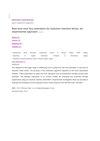考虑自适应反归一化策略的改进多层神经网络水轮机协调功率预测方法
IF 0.9
4区 工程技术
Q4 ENGINEERING, ELECTRICAL & ELECTRONIC
引用次数: 0
摘要
由于经济性和时间成本的限制,水轮机协调现场试验获得的数据不足以完全指导机组运行参数的设置。为了扩大数据量,实现功率点跟踪,避免水轮机物理模型在实际现场难以模拟的高度非线性问题,提出了一种基于改进的多层神经网络的数学预测模型。在预测模型中,利用规则激活函数、L2正则化、Adam优化器及其梯度参数,通过PSO算法进行优化。研究发现,在反归一化过程中缺乏真值,导致神经网络难以进行实际预测。因此,为了提高实际预测精度,提出了一种自适应反归一化策略,可以判断区间的值。通过对水轮机协调和非协调试验的实例分析,结果表明,所提出的预测模型和区间策略能够在小样本条件下高精度有效地预测水轮机的协调工况。本文章由计算机程序翻译,如有差异,请以英文原文为准。
Hydro-Turbine Coordination Power Predictive Method of Improved Multi-Layer Neural Network Considered Adaptive Anti-Normalisation Strategy
Due to the limitation of economics and time cost, the data obtained from hydro-turbine coordination field test are insufficient to fully guide the setting of unit operating parameters. To enlarge the amount of data, realise power point tracking, and avoid the problems of high non-linearity with hydro-turbine physical model which is difficult to simulate in actual field, a mathematical prediction model is proposed based on an improved multi-layer neural network. Using the rule activation function, L2 regularisation, Adam optimiser and its gradient parameters are optimised by PSO algorithm in the prediction model. It is found that lacking true value in the process of anti-normalisation leads to difficulty for actual forecast of neural network. Therefore, an adaptive anti-normalisation strategy is proposed to improve the actual prediction accuracy, which can judge the value of the interval. According to the analysis of examples with hydro-turbine coordination and non-coordination test, the results show that the proposed prediction model and interval strategy can effectively forecast the coordination operating conditions of the turbine with high accuracy under small samples.
求助全文
通过发布文献求助,成功后即可免费获取论文全文。
去求助
来源期刊

Elektronika Ir Elektrotechnika
工程技术-工程:电子与电气
CiteScore
2.40
自引率
7.70%
发文量
44
审稿时长
24 months
期刊介绍:
The journal aims to attract original research papers on featuring practical developments in the field of electronics and electrical engineering. The journal seeks to publish research progress in the field of electronics and electrical engineering with an emphasis on the applied rather than the theoretical in as much detail as possible.
The journal publishes regular papers dealing with the following areas, but not limited to:
Electronics;
Electronic Measurements;
Signal Technology;
Microelectronics;
High Frequency Technology, Microwaves.
Electrical Engineering;
Renewable Energy;
Automation, Robotics;
Telecommunications Engineering.
 求助内容:
求助内容: 应助结果提醒方式:
应助结果提醒方式:


